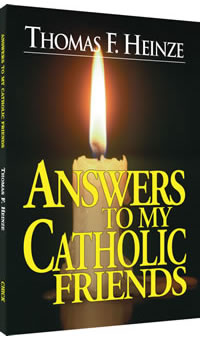Billy Graham Still Sending Converts Back to the Pope
Billy Graham. We know that his messages are solid gospel. Few in or out of the Christian World have not heard of him. Since 1949 he has held the spotlight as the most prominent evangelist in Christendom. He has just finished his 416th crusade in Pasadena, California that drew over 300,000 people in four days. 13,000+ responded to his altar calls. Graham is now 86 years old and has one more crusade scheduled in New York City next year, health permitting.
The Pasadena crusade was on the anniversary of his first Los Angeles revival 55 years ago. It was after that meeting that Graham was "kissed by William Randolph Hearst" according to Dr Cathy Burns in her book, Billy Graham and His Friends. This meant that Hearst had decided to promote Graham's ministry in his nationwide chain of newspapers.
Immediately, reporters and photographers were crawling all over the Graham meetings. Front page articles began to appear in the leading local papers wherever Graham held meetings. One reporter was assigned full time to travel with Graham's team.
In 1991, Graham claimed that this sudden attention remained a mystery. Burns describes a more complex scenario. Regardless, the publicity propelled Graham into the national, if not international, limelight.
Jesus warned, "Woe unto you, when all men shall speak well of you." Over the years, Graham became the friend of presidents and kings, a beloved "America's Pastor."
But the fame came with a price. In his book, Smokescreens, written in 1983, Jack Chick describes how Roman Catholic leaders viewed and used Graham as a key player in their ecumenical plans. As early as 1965, he was a guest speaker at Catholic Belmont Abbey College in North Carolina where he received an honorary doctor's degree. A college official's letter describes Graham's address as "theologically sound" as may have been given by "any other Catholic preacher." The letter further states, "I would state that he could bring Catholics and Protestants together in a healthy ecumenic spirit." Graham was also speaking at several other Catholic colleges at that time.
This prediction was fully realized. In Smokescreens, Chick shows various illustrations. In 1971 Graham is shown meeting with Oakland, California, Catholic Bishop Floyd Begin who lauded Graham's ministry. In 1972 he received a Franciscan Friars' award for true ecumenism. In 1979 Graham praised the pope as a "moral and spiritual leader that believes in something."
In 1981 he was closeted for almost two hours with Pope John Paul II. After the 1982 New England crusade, thousands of those who went forward for salvation were turned over to Catholic clergy for follow-up.
And this hasn't changed. Before the Pasadena crusade this year, The Tidings, official newspaper for the Los Angeles diocese, reported that Cardinal Mahony had written to parish priests to encourage their members to attend the crusade.
Crusade officials bragged that they had "a marvelous agreement" with Graham to give all registration cards to the diocese, of the inquirers who identified themselves as Catholic. The object was to "reincorporate Catholic Crusade participants back into full sacramental life in the Catholic Church." "This is ecumenicity at it finest," said Alexei Smith, Ecumenical and Interreligious Officer for the archdiocese.
There is no doubt that hundreds of thousands have been swept into the kingdom during the Graham crusades. But how tragic that so many who responded to Graham's call to salvation were then sent back to the spiritual bondage and pagan rituals of the pope's prostitute church?
Jack Chick concludes the Smokescreens chapter: "Yes, beloved. Billy Graham, as much as I love him and hate to say it, I believe was cleverly used as a smokescreen and as a pied piper for the whore of Revelation."
For more on this, see "Who Gets The Decision Cards?"
- See more articles on related topics:
- Ecumenism
- Other Subjects
Other Articles from January/February 2005:
- Tract Fellowship Expanding to Include Gospel Video
- Hostility to Christians Increasing World Wide
- Islamization of Europe Far Advanced
- A Message From Jack Chick
- Chick Mail Bag Jan-2005
- Prison Ministry Letters: Jan-2005
- Homosexual Teachers Emboldened by Marriage Law
- Mel Gibson's Passion a Flop as a Soul Winner
- Tract Passing Tips - January 2005
More on Other Subjects:
Products of Interest:
-

Billy Graham and His Friends
788 pages
Is Billy Graham the pope`s "pied piper?" -

Answers To My Catholic Friends
64 pages
A gentle witness you can give Catholics that deals with venerating images, purgatory, where popes go when they die, and more. -

Smokescreens
96 pages
Jack Chick shows that the ecumenical movement isn’t designed to bring all Christians into unity. That’s just a smokescreen, hiding the Vatican’s real intent, to stamp out religious freedom and rule the world.



